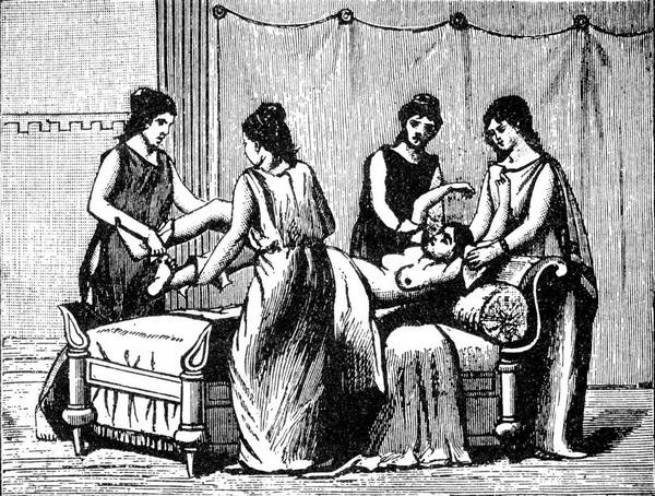The right to abortion in Greece has been protected by the constitution since 1986, but in reality many women complain about public hospitals that try to prevent them “using arguments from the Middle Ages.”
When they visit a hospital to terminate a pregnancy, some medical and nursing staff actively and often incorrectly try to change their decision, citing ethical reasons, sometimes using expressions such as “God will punish you.”
Characteristic is the testimony of a woman who spoke on one of the Greek television channels, where she describes the attitude towards her friend, whom she accompanied to the Alexandra State Hospital for an abortion, quotes newsbeast.gr:
“They tried to stop her using medieval arguments, like it’s a sin, you can’t have children whenever you want, because God, the Universe, Buddha will take revenge on you. They, let’s say, did not support my friend psychologically at all. In Alexandra.”
In the hospital, she says, they nevertheless performed the operation, accompanying it with similar statements, but the “Calvary” did not stop there:
“Because after many days of bleeding, we come to the hospital again and are told that the operation was done incorrectly the first time and my friend will have to have a second operation. In the end, this too turned out to be a failure. As a result, her periods stopped for several months and she had to undergo a third operation. All this suffering was enormous.”
An NHS doctor points out the class aspect of the problem:
“If by law you have the right to practice medicine in both the private and public sectors, then for financial reasons the preference is given to the private sector, and when this is not controlled anywhere, it does not take long to realize that there will be too many violations. In addition, if in some city everyone is denied, the judicial authorities should take care of this in order to understand how this right will exist in this city, whether the city needs to be changed, whether it is necessary to pay, for example, a woman who does not have the means to do so. financial opportunities.”
What she heard as a student from university doctors fully reveals the essence of the problem of abortion in Greece:
“When we asked one of them if the clinic performed abortions, the answer was: “Yes, but I’m the only one who does it.” We were a little taken aback, and the next day at a theoretical lesson we asked the teacher, who was also an associate professor, whether abortions were carried out and why not, to which we received the answer that for ethical reasons we can refuse, and this is our right. And then the student asked again if you do this in practice. And we received the answer: everything has its price.”
MEGA spoke to the staff of Red Umbrella Athens, which is a center for empowering sex workers, and what they had to say is indicative of the current situation:
“A patient came to us, she was looking for a gynecologist […] and told us that she was pregnant due to a client's condom breaking. She had an unwanted pregnancy, we referred her to a government hospital and she came the next week at the appointed time to RED UMBRELLA to tell us what happened. She said that she was kicked out of there, she talked to someone from the staff… I don’t remember exactly if she was a nurse, I don’t remember what her name was. And she tried to convince her that it was a sin and that God would say, and it doesn’t matter that you don’t know who the father is, and how it happened, and… well, the woman got upset and just left.”
Traditionally, the “invention” of abortion is attributed to Azazel, one of the two hundred fallen angels whose descendants perished in the Great Flood. In fairness, it should be noted that the legend of Azazel itself is contained in the famous apocrypha – the Book of Enoch, the canonicity of which, to put it mildly, is questioned. But even this source does not say a word about abortion.
Many ancient religions, such as Hinduism and Zoroastrianism, contained an indirect or direct ban on abortion, which was always equated to murder. Abortion is also assessed from a Buddhist point of view (however, in modern Buddhism, as in some Jewish movements, abortion is allowed if the birth of a child threatens the life of the mother).
IN ancient Greece and Romeknown for their comparative freethinking, approaches to abortion varied widely. Thus, the famous Greek philosopher of the 4th century. BC e. Aristotle unequivocally spoke out in support of abortion: “If children are born to spouses against expectation, then the fetus should be eradicated before sensations and life appeared in it.” As we see, even then Aristotle posed the important problem of determining the time of emergence of the subjectivity of the fetus – the “breath of life,” as he put it. Of course, his teacher, Plato, shared the same point of view. But his contemporary and compatriot Hippocrates, the famous doctor, was categorically against abortion. In the text of his oath, in which special attention was paid to the high moral character of the healer, abortion is categorically prohibited: “In the same way, I will not give any woman an abortion pessary,” says the famous oath (from all its modern analogues, the words about the inadmissibility of abortion have been removed).







More Stories
Habit "jump out" from a vehicle may result in a fine
The European Union will count the homeless (video)
50-year-old Victoria Beckham and her sexual message